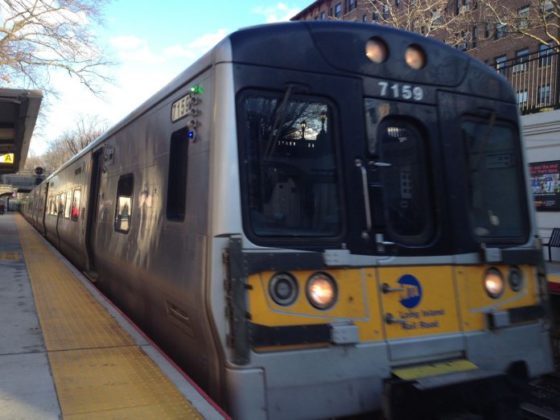
Metropolitan Transportation Authority officials announced dates for two virtual public hearings for residents to discuss the proposed changes to the Port Washington branch, which have caught the ire of North Shore commuters and elected officials in recent weeks.
The proposed changes, residents and officials said, would short change commuters throughout Port Washington, Plandome, Manhasset and Great Neck by decreasing express service. The changes are part of the MTA’s $11.2 billion East Side Access Project.
While Long Island Rail Road officials said a majority of Port Washington line commuters would benefit from the updated schedule, saying that there will be a 70% increase in service during the morning and 43% increase during the evening, local officials and town residents said the agency should prioritize the travel time of its daily commuters.
The two public hearings for residents to comment on the proposed schedule, which is not expected to go into effect until December., will be held on Aug. 4 from 6-8 p.m. and Aug. 11 during the same time frame.
LIRR officials said each meeting will feature a maximum of 250 registered speakers. Those interested in speaking during the Aug. 4 meeting can register on the MTA website beginning July 28.
State Sen. Anna Kaplan (D-North Hills) and state Assemblywoman Gina Sillitti (D-Port Washington), who have spearheaded efforts to make residents’ voices heard, lauded those who have spoken up to ensure Nassau commuters have their express service maintained.
It’s vital that “impacted residents have the opportunity to make their voices heard with the MTA before any service changes are decided upon,” Kaplan said in a statement.
“I would like to thank all of the commuters, residents, and community leaders who attended the first public hearing and voiced their concerns to the Long Island Rail Road about the proposed schedule changes,” Sillitti said. “It is because of your activism that we reached capacity at the first hearing and will now be having two additional meetings in the near future.”
Kaplan and Sillitti said more than 2,200 responses were submitted in a survey conducted over the past month, with an “overwhelming majority” being in opposition to the draft schedule.
Nassau officials have been united in their opposition to the proposed changes. A press conference held last week in Great Neck featured bipartisan calls for the MTA to maintain the quality level of service LIRR commuters have seen for years.
“Every day, thousands of Nassau County residents depend on the Long Island Rail Road to commute to work and come home,” Nassau County Executive Bruce Blakeman said. “Their new schedule plan makes it much harder for people to plan their schedule. In effect, they’re cutting service.”
Village of Great Neck Mayor Pedram Bral said the LIRR is a “lifeline” for many of the peninsula’s residents and local officials who work throughout New York City.
The proposed schedule changes, he said, are going to negatively affect the property values of homes along the Port Washington Line, which include parts of Plandome and North Hills. The extra few minutes each way on the train, he said, add up to hours per month when adults are away from their families.
“These are minutes that are going to pile up and become hours we are not spending with our loved ones,” Bral said. “We urge, collectively for everyone… to fight and ask the MTA… to bring us higher quality transit because we’re paying premium prices to live here.”
Under the current schedule he said, there are currently six trains that run from the Great Neck station between 7-8:30 a.m. Under the changes, that will go down to just two trains during the same rush hour weekday period, Thomaston Mayor Steven Weinberg said.
Town of North Hempstead Supervisor Jennifer DeSena called the proposed changes “unacceptable” and has been involved in preliminary talks with agency representatives to remedy the issues.
“Discussions will continue between the Long Island Rail Road and the town regarding the desire to see certain infrastructure improvements, and the town is open to these discussions,” DeSena said. “But in the meantime, the Long Island Rail Road must show some good faith and restore these express service cuts.”
MTA spokeswoman Joanna Flores said in a statement the agency is “prepared to work with the town” to “provide even more service” on the Port Washington branch, noting that improvements would rely on the town supporting efforts to expand train storage along the line.
Pocket tracks, typically located at or near stations, are a place for trains to pull over and park without using the main tracks.
Flores, in another statement to Blank Slate Media, said the agency’s investment allows for an overall increase in service by 40% and will provide hundreds of Long Island residents with enhanced travel opportunities.
“A key to this huge service increase is the completion of the historic third track project — and that project is on time, under budget and already providing benefits after decades of NIMBY opposition from some elected officials,” Flores said.
Port Washington resident Ian Rasmussen said a plan to add three additional stations to the line is “adding insult to injury.”
Rasmussen also said the commutes, which could add up to eight minutes on some trains could impact the Port Washington area property values. Town Councilman Peter Zuckerman said many individuals move to the area because of the accessibility individuals have to New York City while maintaining a suburban lifestyle.
“As someone who commuted into the city for many years, I understand how upsetting it can be that the previous schedule has been changed,” Zuckerman said. “Many of my constituents have relied on this schedule for a number of years and have moved to our community because of the convenience of the LIRR to New York City.”






